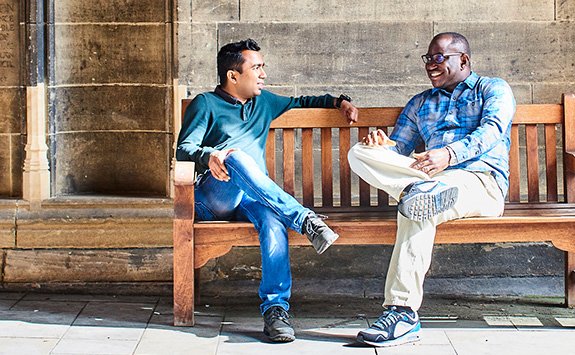ATAS - Academic Technology Approval Scheme
Important notice for ATAS applicants - Gmail issue
We have been informed that there is an issue with applicants using a Gmail address to apply for their ATAS. Please see the information below copied from the official ATAS page:
- we are currently experiencing technical issues with Gmail addresses. This is preventing some users from receiving ATAS confirmation emails
- use an alternative email address when applying for your ATAS certificate
- if you have already applied using a Gmail address, check with your Higher Education Institution (HEI) in the first instance to see if they can forward your ATAS certificate to you. If the matter is still unresolved, contact the ATAS team: ATAS@fcdo.gov.uk
Why is ATAS approval required?
Approval is required where the subjects and research areas are those where knowledge could be used in programmes to develop:
- Advanced Conventional Military Technology (ACMT)
- weapons of mass destruction (WMDs)
- their means of delivery
Researchers and students in these sensitive subjects must apply for an Academic Technology Approval Scheme (ATAS) certificate before they can study or start research in the UK.
How to apply for ATAS clearance:
You can apply for ATAS clearance via the gov.uk website. There is also further guidance on how to apply here.

Who needs ATAS approval?
The Academic Technology Approval Scheme (ATAS) applies to:
- all international students and researchers (apart from exempt nationalities, see list below)
- those who are subject to UK immigration control
- anyone intending to study or research at postgraduate level in certain sensitive subjects
Students and researchers who don't need an ATAS certificate must be nationals of:
- EU countries
- the European Economic Area (EEA)
- Australia
- Canada
- Japan
- New Zealand
- Singapore
- South Korea
- Switzerland
- the United States of America
Researchers and students of all other nationalities must apply for an ATAS certificate. You must apply if you are undertaking a postgraduate course or research in certain sensitive subjects in the UK. If you are applying to study an undergraduate course with an integrated master’s year you may also need ATAS clearance. To check if you require ATAS clearance, please visit the gov.uk website.
ATAS clearance will be required in order for you to make a visa application for a student route. For further information please visit our visa and immigration pages.
When should I apply?
You can apply for ATAS once you have been sent your ATAS instructions which will be no more than 6 months before the start of your programme.
Please wait until you are sent this information as it will contain all of the details that you need to apply for ATAS. This includes a list of the modules on your programme. You will need to copy all these modules onto the application form. If you omit any of the modules it may result in you having to apply for ATAS again.
If you have applied for more than one programme you will need to submit a new application for clearance for each programme. These can all be submitted at the same time.
How to complete the online ATAS application form?
The online application form has 10 sections. You should complete it fully, with as much detail as possible in each section. The application portal is the same for researchers and students.
ATAS applications with incorrect information will cause delays to the processing of your application.
Proposed course of study/area of research:
The University or research institute you are proposing to study/research at will provide you with the relevant details. For example: in your conditional offer letter or statement of research. They will advise you of the appropriate CAH3 code.
If you are a research student, you will need to submit the exact research description stated on your university letter. You should also add your supervisor stated on your letter, or the Head of Department if you are still waiting for a supervisor allocation.
If you are a masters or undergraduate student, you should submit the full list of modules for your programme.
Personal details:
Details from this section will be included in your ATAS certificate. Complete this carefully and in full and review it before submitting. If you have served in the armed forces or trained in Chemical Biological Radiological Nuclear (CBRN), you should provide details including:
- courses undertaken
- relevant roles
- if applicable, years of service
If you have undertaken government funded research, include the funding agency and details of the project. Mistakes and transposed numbers are regular errors in this area. If the details provided do not match the details in your passport exactly, it may affect or delay your visa application.
Spouse:
If you are married and planning to bring your spouse into the UK, you'll need to include their details here.
If your spouse chooses to study or research an ATAS relevant subject while accompanying you, they will need to apply separately for their own ATAS certificate.
Contact details:
Make sure your contact details are accurate. The ATAS certificate will be sent to the preferred email address you include in this section.
Undergraduate/ Postgraduate studies:
You'll need to provide information on all previous undergraduate and postgraduate studies you have undertaken.
Other studies:
If you have undertaken any other studies that you think may be relevant to your application, include this on the form.
Published Papers:
If you have had any academic or professional papers published, either on your own, or with co-publishers, you'll need to include this here.
Employment History:
With as much detail as possible, include any jobs you have held. You should include jobs that relate to your proposed course of study or research area.
Referees:
You'll need to provide details of two referees who have known you for a minimum of 3 years. At least one of the referees must be from the academic sector.
If you have work experience, you should include a referee from your employment. A referee from your home country would be preferable, but it is not essential if you have studied and/or worked in another country. Family members are not accepted as referees.
Financial Sponsors:
Include details of sponsors you have for the funding of your proposed studies. If you are waiting for a funding decision, include this and note the decision is pending.
If you are funding your own studies or research, include your name and address in the relevant boxes.
If another family member is paying for your studies, include their details.
What should I do when I receive the decision?
You will need to upload the approval or refusal to your undergraduate or postgraduate application through your applicant portal. Admissions will then:
- check the document and if all correct and you received the clearance
- mark the condition on your offer as met
If you have submitted the request for approval using incorrect modules, we will advise you to reapply. If you received a refusal, you may be able to submit an appeal or reapply, but the University will be able to advise you on this.
What to do if you receive a new passport after you receive ATAS clearance?
Once you receive your ATAS certificate, where there is time, if you need to obtain a new passport after submission you are advised to:
- contact ATAS by email with a scanned copy of your new passport
- ask for a new ATAS certificate to be issued with the new passport number on
If there isn't enough time, you are advised to submit the visa application with both passports.
Contact the ATAS team
If you have any queries about your application, please email ATAS here.
An application will need to have been made at least 20 working days prior to any query. The ATAS team will not reply before this time.
The ATAS team:
- is available from Monday to Friday, 09:00 to 17:00 (excluding bank holidays)
- aim to answer your email within five working days (this may not be possible during busy periods)
They are unable to provide a telephone service to students.
